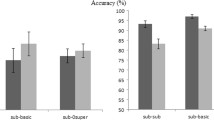Abstract
The study examined the performance in a Schematic Concept Formation task in a sample of 53 Anglo, sixth-grade children and related that performance to measures of intellectual ability. The task was of a 3-choice oddity problem with increasing levels of difficulty. Accuracy increased across trials within the first two levels of difficulty but decreased within the third level of difficulty. The effect of using I.Q. to classify performance across trials was present but not strong. A subset of the verbal descriptors was found to be more related to performance on the Schematic Concept Formation task than to the measures of intellectual ability. Implications of the results relevant to cognitive attitude are discussed.
Similar content being viewed by others
References
AIKEN, L., & BROWN, R. B. 1971. A feature utilization analysis of the perception of pattern class structure. Perception and Psychophysics, 9, 279–283.
AIKEN, L. S., & WILLIAMS, T. M. 1973. Developmental aspects of schematic concept formation: The acquisition of class concepts in a non-verbal context. Developmental Psychology, 8, 162–167.
ATTNEAVE, F. 1957. Transfer of experience with a class-schema to identification-learning of patterns and shapes. Journal of Experimental Psychology, 54, 81–88.
BERSTED, C. T., BROWN, B. R., & EVANS, S. H. 1969. Presorting with stimuli clustered in a multidimensional attribute space. Perception and Psychophysics, 6, 409–413.
BROWN, B.R., & EVANS, S. H. 1969. Perceptual learning in pattern discrimination tasks with two and three schema categories. Psychonomic Science, 15, 101–103.
EDMONDS, E. M., & EVANS, S. H. 1966. Schema learning without a prototype. Psychonomic Science, 5, 247–248.
EDMONDS, E. M., & EVANS, S. H., & MUELLER, M. R. 1966. Learning how to learn schemata. Psychonomic Science, 6, 177–178.
EDMONDS, E. M., & MUELLER, M. R. 1967. The role of schemata in perceptual learning. Psychonomic Science, 8, 239–240.
EVANS, S. H. 1964. A model for perceptual category formation. Unpublished doctoral dissertation, Texas Christian University.
EVANS, S. H. 1967. A brief statement of schema theory. Psychonomic Science, 8, 87–88.
EVANS, S. H. 1973. Preliminary studies on a test of pattern learning f or aptitude assessment with disadvantaged students. Texas Christian University, Project No. 1F053, Contract No. Oec-6-71-05324509), U.S. Department of Health, Education, and Welfare.
EVANS, S. H., & ARNOLT, M. D. 1967. Schematic concept formation: Demonstration in a free sorting task. Psychonomic Science, 9, 221–222.
GLASER, R. 1972. Individuals and learning: the new aptitudes. Educational Researcher, 1 (6), 5–13.
JONES, E. E., & HOLLEY, J. R. 1970. Schema utilization in pattern perception. Psychonomic Science, 18, 197–198.
LANE, S. H., & EVANS, S. H. 1972. Some aspects of individual differences in schematic concept formation. U.S. Army, Human Engineering Laboratories Technical Memorandum, (9–72).
LINDQUIST, E. F., & FELDT, L. S. 1970. Iowa Tests of Educational Development. Iowa City: University of Iowa.
NELSON, M. J., LEMKE, T. A., & KELSO, P. C. 1961. Henmon-Nelson Test of Mental Ability, Form A, Iowa. Boston: Houghton Mifflin.
OLDFIELD, R. C. 1954. Memory mechanisms and the theory of schemata. British Journal of Psychology, 45, 14–23.
PRICE, J. T., & EVANS, S. H. 1972. Schematic concept formation as a predictor of success in a remedial education program. In S. H. Evans (Chm.), Individual difference variables and schematic concept formation: Explorations. Symposium presented at the Southwestern Psychological Association, Oklahoma City.
RANKIN, W. D., & EVANS, S. H. 1968. Facilitation of schematic concept formation as a function of two within-schema pretraining models. Psychonomic Science, 13, 325–326.
RANKIN, W. D., MARKLEY, R. P., & EVANS, S. H. 1970. Pythagorean distance and the judged similarity of schematic stimuli. Perception and Psychophysics, 7, 103–107.
ROHWER, W. D., Jr. 1970a. Images and pictures in children’s learning. Psychological Bulletin, 73, 393–403.
ROHWER, W. D., Jr. 1970b. Mental elaboration and proficient learning. In J. P. Hill (Ed.), Minnesota Symposia on Child Psychology. Minneapolis: University of Minnesota.
ROHWER, W. D., Jr. 1971. Learning, race and school success. Review of Educational Research, 41, 191–210.
ROSNER, J. 1972. The development and validation of an individualized perceptual skills curriculum. Pittsburgh: University of Pittsburgh, Learning Research and Development Center.
SHIELDS, R. V., GORDON, M. A., & EVANS, S. H. 1969. Schematic concept formation in relationship to mental ability in adolescents. Psychonomic Science, 17, 361–362.
WOODWORTH, R.S. 1938. Experimental psychology. New York: Holt, Rinehart & Winston.
Author information
Authors and Affiliations
Additional information
Appreciation is extended to Dr. S. H. Evans, Dr. R. M. Fenker, and Dr. D. F. Dansereau of the Institute for the Study of Cognitive Systems for their helpful assistance in the Study and to Lucy Hagenbuch, Linda Dus, and Judy Barker for their assistance in data collection and analysis.
Rights and permissions
About this article
Cite this article
Lane, S.H. Schematic Concept Formation as A Measure of Cognitive Aptitude. Psychol Rec 25, 525–533 (1975). https://doi.org/10.1007/BF03394344
Published:
Issue Date:
DOI: https://doi.org/10.1007/BF03394344




